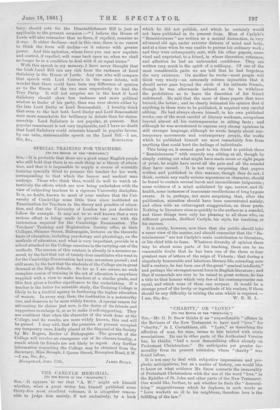THE CA.RLYLE MEMORIAL.
[TO THE EDITOR OF THE SPEOTATOR.1
Sta,—It appears to me that "A. W." might ask himself 'whether, when a great writer has himself published some thirty-five most excellent volumes, it is altogether reason- able to judge him mainly, if not exclusively, by a book which he did not publish, and which he certainly would not have published in its present form. Most of Carlyle's " Reminiscences " are written as a mental distraction, in very advanced old age, under extreme distress of mind and body, and at a time when he was unable to pursue his ordinary work ; and they were subsequently sent, with his other papers, unre- vised and unprinted, to a friend, in whose discretion, reticence, and affection he had an unbounded confidence. They are written very much in the spirit of a soliloquy. Of one of the most considerable parts we are told that he had forgotten the very existence. On another he wrote—most people will think very wisely—an extremely solemn injunction that it should never pass beyond the circle of his intimate friends, though he was afterwards induced so far to withdraw the prohibition as to leave the discretion of his friend unfettered. He said that the more of these papers that were burned, the better ; and he clearly intimated his opinion that if anything in them were to be published, it required very careful editing. He had always shown himself, in his own published works, one of the most careful of literary workmen, scrupulous beyond almost all his contemporaries in sifting facts ; and although he was accustomed to express very strong opinions in still stronger language, although he wrote largely about con- temporary movements and contemporary people, the works which he published himself are most remarkably free front anything that could hurt the feelings of individuals.
This being so, it seemed good to his friend to publish these " Reminiscences " with scarcely any editing at all, though by simply cutting out what might have made seven or eight pages of print, he might have saved all the pain and all the scandal they have caused. It is not very surprising that papers written and published in this manner, though they do not, I think, contain any really serious aspersions on character, should be found to contain several harsh and inconsiderate judgments ;. some evidence of a mind acidulated by age, sorrow, and ill- health, some instances of inaccurate recollections of long bygone events. It is, perhaps, not more surprising that, after the publication, attention should have been concentrated mainly, and often with an extravagant exaggeration, on those parts. Nothing in literature rises so quickly to the surface as a scandal, and these things were only too pleasing to all those who, on different grounds, disliked Carlyle, his style, his teaching, or his success.
It is surely, however, now time that the public should take a saner view of the matter, and should remember that the " Re- miniscences " are not Carlyle's main contribution to literature, or his chief title to fame. Whatever diversity of opinion there may be about some parts of his teaching, there can be no reasonable doubt that he has been one of the three or four greatest men of letters of the reign of Victoria ; that during a singularly honourable and laborious literary life, extending over half a century, he has been one of the great" seminal intellects," and perhaps the strongest moral force in English literature ; and that if memorials are ever to be raised to great writers, he has a title to that honour which very few of his contemporaries can equal, and which none of them can surpass. It would be a strange proof of the levity or ingratitude of his readers, if there should be any difficulty in raising the sum which is required.—
































 Previous page
Previous page